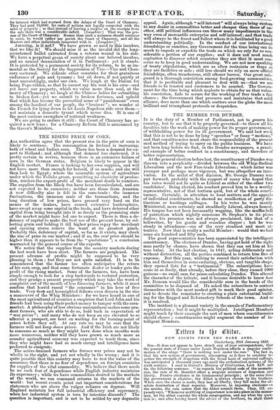THE MEMBER FOR DUNDEE.
IT is the duty of a Member of Parliament, not to govern his country, but to see that it be properly governed—to throw all his faculties into the work of making power for its proper government, of withholding power for its ill government. We said last week that this is not to be done by long " speeches" or fussy "motions," and that constituencies must share the responsibility of the present mad method of trying to carry on the public business. We have not been long before we find, in the Dundee newspapers, a practi- cal example of better conduct in a constituency, and therefore of better representation.
At the general election before last, the constituency of Dundee was thrown into a perplexity—divided between the old Whig-Radical Liberalism and the new Free-trade Liberalism ; which latter was younger and perhaps more vigorous, but was altogether an inno- vation. In the midst of that division, Mr. George Duncan was put forward, probably with the support of many who hoped that his votes would not be quite so Liberal as either of the or two candidates'. Being elected, bis conduct proved him to be a worthy representative, not of that tertiura quid, but of the whole consti- tuency. Certainly, in attention to local matters and the appeals of individual constituents, he showed no recollection of party dis- tinctions or hustings suffrages. In his votes he was mostly Ministerial, more certainly and steadfastly Liberal, always honest. His tongue has not been incessantly wagging, like the muffin-bell of patriotism which nightly summons St. Stephen's to its. pious duties ; his presence was not always proclaimed, like that of a bellwether, by his gentle and ceaseless clapper ; but he was steady in attendance—one of the very steadiest and most at- tentive. Now that is really a useful Member : would that we had some six hundred and fifty such. The good representative has been appreciated by the intelligent constituency. The electors of Dundee, having got hold of the right man partly by chance, have shown that they can set him at his true value. At the last election, in 1847, acting deliberately and without distraction, all the parties combined to return him free of expense. But this year, wishing to record their satisfaction with him and themselves in some enduring, obvious, and tangible shape, they opened lista for a "testimonial." The subscriptions have come in so freely, that already, before they close, they exceed 1000 guineas—no small sum for pence-calculating Dundee. This altered the character of the tribute, and it became desirable to know how Mr. Duncan would like the considerable sum in the hands of the committee to be disposed of. He asked the subscribers to content themselves with the moat modest gift to mark their good opinion, and to devote the remainder to erecting a plain substantial build- ing for the Ragged and Reformatory Schools of the town. And so it is resolved.
The incident is a pleasant variety in the annals of Parliamentary representation ; but it might be multiplied. Intelligent Members might teach by their example the sort of men whom constituencies should chooser constituencies might augment the number of in- telligent Members.


























 Previous page
Previous page